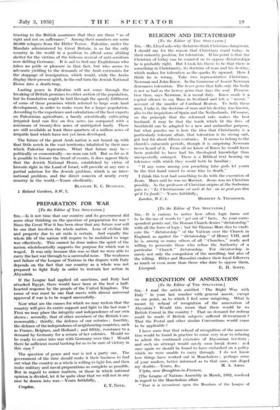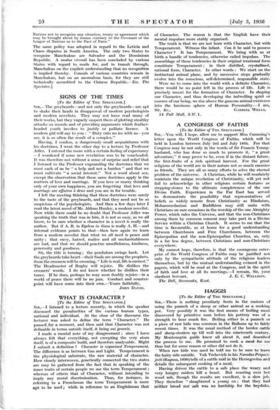RECOGNITION OF ANNEXATION
[To the Editor of TUE SPECTATOR.]
SIR,—I read the article entitled " The Right Way with Italy " in your last number with general assent, except on one point, as to which I feel some misgiving. What is meant by. refusal of recognition of the annexation of Abyssinia ? Would this mean that there would be no British Consul in the country ? That no demand for redress could be made if British subjects suffered ill-treatment ? That the Postal and other similar Conventions would cease to be applicable ?
I have some fear that refusal of' recognition of the annexa- tion would be found in practice to come very near to refusing to admit the continued existence Of Abyssinian territory ; and such an attempt would surely soon break down : anti once again we should be found to have embarked on a policy which we were unable to carry through. I do not know how things have worked out in Manchukuo ; perhaps some of your readers, better informed as to that case, can dispel my doubts.—Yours, &e. M. S. Amos. Ulpha, near Broughton-in-Furness.
[The League of Nations Assembly in March, 1932, resolved in regard to the Manchukuo affair
"That it is incumbent upon the Members of the Leagne of
Nations not to recognise any situation, treaty or agreement which. may be brought about by means contrary to the Covenant of the League of Nations or to the Pact of Paris."
The same policy was adopted in regaid to the Leticia and Chaco disputes in South America. The only two States to recognise Manchukuo are Salvador and the Dominican Republic. A modus vivendi has been concluded by various States with regard to mails for, and in transit through, Manchukuo on the explicit understanding that no recognition is• implied thereby. Consuls of various countries remain in Manchukuo, but on an anomalous basis, for they are still technically accredited to the Chinese Republic.—En. The Spectator.]















































 Previous page
Previous page